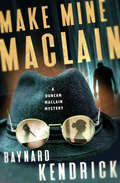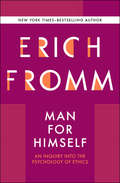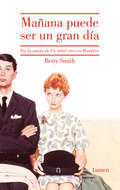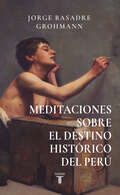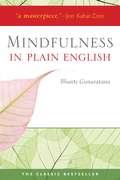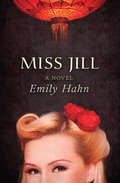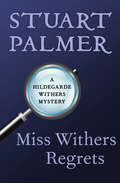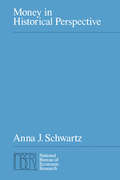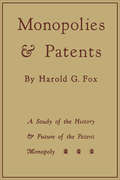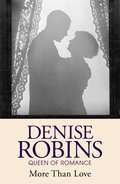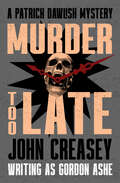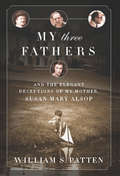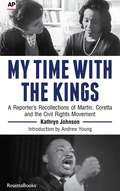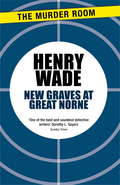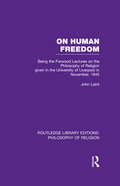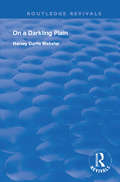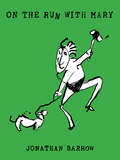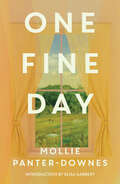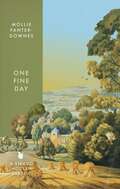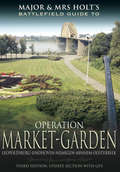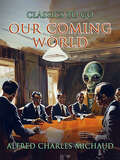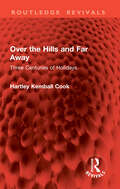- Table View
- List View
Make Mine Maclain (The Duncan Maclain Mysteries)
by Baynard KendrickThree mystery novelettes featuring a blind detective and his two trusty German Shepherds by the author of Out of Control.Following the loss of his sight in World War I, ex–intelligence officer Capt. Duncan Maclain honed his other senses and became one of the most successful and well-known private investigators in New York City. These are some of his adventures . . .In &“The Silent Whistle,&” the captain heads west to California with his seeing eye dog Schnucke to advise on a television series about a blind man, but things go south when he discovers the studio head&’s secretary with a knife in his back . . .In &“Melody in Death,&” the captain is visiting a friend at the Knickerbocker Opera Company with Schnucke when he finds the body of a wealthy benefactor backstage . . .In &“The Murderer Who Wanted More,&” a young artist is on edge after she&’s attacked in her Manhattan apartment building and almost shot near her aunt&’s Staten Island mansion. Fortunately, she has one friend whose unique powers of detection come in handy in times like these: Captain Maclain!Baynard Kendrick was the first American to enlist in the Canadian Army during World War I. While in London, he met a blind English soldier whose observational skills inspired the character of Capt. Duncan Maclain. Kendrick was also a founding member of the Mystery Writers of America and winner of the organization&’s Grand Master Award.
Man for Himself: An Inquiry Into the Psychology of Ethics (Routledge Classics Ser.)
by Erich Fromm&“There is no meaning to life except the meaning man gives his life by the unfolding of his powers.&” —Erich FrommAre we primarily determined by nature or nurture? What are the best ways that people can live productively? In Man for Himself, renowned social philosopher Erich Fromm posits: With the gifts of self-consciousness and imagination, any individual can give his or her own unique answer. This answer is rooted in our human nature, and should correspond to mankind&’s powers of reason and love. Therefore, Fromm reasons, &“living itself is an art.&” In his humanistic concept of man, Fromm describes various character orientations that are to be found in Western culture. For the first time, Fromm analyzes the parallels between economic concepts of market value and how we value others and ourselves—the idea of personality as a commodity. He argues for a return to humanistic ethics, and discusses issues such as the question of conscience, of selfishness and self-love, and of pleasure and happiness. This ebook features an illustrated biography of Erich Fromm including rare images and never-before-seen documents from the author&’s estate.
Mañana puede ser un gran día
by Betty SmithLumen rescata Mañana puede ser un gran día, de la autora de la conmovedora novela Un árbol crece en Brooklyn Estamos en Brooklyn y corren los años veinte. La chiquilla que conocimos en Un árbol crece en Brooklyn, la primera novela de Betty Smith, es ahora una joven mujer de nombre Margie, decidida a escapar de la pobreza y mediocridad que la rodean en su casa, donde los días transcurren entre las horas de oficina, las quejas de una madre dominante y los gestos tímidos de un padre derrotado por la falta de ambición y cariño. Margie sueña mientras camina por las calles frías de su barrio, pero finalmente las viejas costumbres se imponen: solo el matrimonio y el gobierno de una casa propia podían ofrecer a una mujer de aquellos tiempos cierto margen de libertad, y así la joven se casa con Frankie Malone, un hombre que tiene poco que contar y mucho que esconder... Esta historia, la de tantas parejas que callaron a principios del siglo XX, cobra sentido gracias al talento de Betty Smith, a sus ganas de hablar y mostrar los hilos rotos con que se tejió el gran sueño americano.
Mañana puede ser un gran día
by Betty SmithSegunda novela de Betty Smith, autora de la exitosa Un árbol crece en Brooklyn, Mañana puede ser un gran día es la historia de una entre tantas parejas que callaron a comienzos del siglo XX, tejida con los hilos rotos del sueño americano. Estamos en Brooklyn y corren los años veinte. La chiquilla que conocimos en Un árbol crece en Brooklyn, la primera novela de Betty Smith, es ahora una joven mujer de nombre Margie, decidida a escapar de la pobreza y mediocridad que la rodean en su casa, donde los días transcurren entre las horas de oficina, las quejas de una madre dominante y los gestos tímidos de un padre derrotado por la falta de ambición y cariño. Margie sueña mientras camina por las calles frías de su barrio, pero finalmente las viejas costumbres se imponen: solo el matrimonio y el gobierno de una casa propia podían ofrecer a una mujer de aquellos tiempos cierto margen de libertad, y así la joven se casa con Frankie Malone, un hombre que tiene poco que contar y mucho que esconder... Esta historia, la de tantas parejas que callaron a principios del siglo XX, cobra sentido gracias al talento de Betty Smith, a sus ganas de hablar y mostrar los hilos rotos con que se tejió el gran sueño americano. Reseña:«La calidez de la comprensión y la voz de la autenticidad rigen sus páginas. Y la escritura consigue que sus personajes su muevan, cobren vida propia.»Kirkus Reviews
Meditaciones sobre el destino histórico del Perú
by Jorge Basadre GrohmannEL MÁS IMPORTANTE PENSADOR DEL SIGLO XX EN UNA BÚSQUEDA INTELIGENTE Y EMOTIVA DE LA RAZÓN HISTÓRICA DEL PERÚ Pieza representativa de la monumental obra de Jorge Basadre Grohmann, este volumen de artículos y ensayos, aparecidos en diarios y revistas del país y el extranjero, es uno de los mejores esfuerzos intelectuales del siglo pasado por comprender, interpretar y definir la esencia del desarrollo histórico del Perú.Entre sus páginas el autor ejerce un llamado para la conformación de "una conciencia de la patria y de la integración nacional". Lo hace procurando dirigir su discurso al ciudadano, en especial a los educadores y las nuevas generaciones, en quienes cifra el destino de la nación. A ambos los conmina a pensar el Perú como una continuidad que atraviesa las épocas y los periodos y se proyecta generoso siempre hacia el futuro, lejos de los compartimentos estancos propios del sistema educativo, así como del "eruditismo infértil" y de las luchas fratricidas. En suma, una apuesta por el sí, por la promesa democrática, por la integración del territorio y sus habitantes, incluso a pesar de "la barata retórica electoral" y los reveses del siglo XIX. Meditaciones sobre el destino histórico del Perú es un conjunto de textos de esmerado rigor pedagógico y filosófico, en el que abunda la lucidez y el optimismo. De allí que este libro resulte insoslayable para entender, aún hoy, por qué debemos buscar el bien común por encima de nuestras diferencias políticas, sociales y culturales. «… estas Meditaciones son el sustento de la obra de Basadre, los planos de la catedral. Aquí están sus motivaciones y esperanzas, sus juicios más generales, las leyes y axiomas del sistema basadriano». Alberto Vergara
Mindfulness in Plain English
by Bhante Henepola GunaratanaWith over a quarter of a million copies sold, Mindfulness in Plain English is one of the most influential books in the burgeoning field of mindfulness and a timeless classic introduction to meditation. This is a book that people read, love, and share - a book that people talk about, write about, reflect on, and return to over and over again. Bhante Gunaratana is also the author of Eight Mindful Steps to Happiness, Beyond Mindfulness in Plain English, The Four Foundations of Mindfulness in Plain English, and his memoir Journey to Mindfulness.
Miss Jill: A Novel
by Emily HahnA novel about an enterprising Shanghai streetwalker from the &“American literary treasure&” and author of the memoir China to Me (The New Yorker). Meet Miss Jill, a young woman pursuing the oldest profession in prewar Shanghai. Fifteen, blonde, and full of personality, Jill begins her career as a Japanese banker&’s mistress. Soon after, she becomes a European prostitute in the house of Annette, and believes that any day now she&’ll be married to a nobleman. But none of her adventures prepare Miss Jill for the war and her subsequent internment. An early feminist and an American journalist who traveled to the Belgian Congo and China in the 1930s, Emily Hahn wrote more than fifty books, both fiction and nonfiction; this is Hahn at her touching and entertaining best, portraying an exotic place in a dramatic time with great authenticity and empathy.
Miss Withers Regrets (The Hildegarde Withers Mysteries #9)
by Stuart PalmerThere are lessons to be learned for retired teacher Hildegarde Withers when a society murder reveals a love triangle gone bad. The war in Europe is over, and America&’s fighting men are coming home. Lieutenant Pat Montague spent the war dreaming of a return to his beloved: society princess Helen Abbott. But when Uncle Sam finally lets him go, Pat finds that Helen has become Mrs. Huntley Cairns, and he has nothing to return to at all. He goes to see Helen at the Cairns mansion, only to stumble upon his rival&’s murdered corpse. The jealous soldier is the obvious suspect, but Pat&’s friends know he is innocent, and entreat Hildegarde Withers—elementary school teacher and talented sleuth—to clear his name. Huntley was rumored to be involved in the black market, and Miss Withers soon discovers his killer was far more sinister than a soldier with a grudge. Miss Withers Regrets is part of the Hildegarde Withers Mysteries series, which also includes The Penguin Pool Murder and Murder on the Blackboard.
Money in Historical Perspective
by Milton Friedman Michael D. Bordo Anna J. SchwartzModern monetary economics has been significantly influenced by the knowledge and insight brought to the field by the work of Anna J. Schwartz, an economist whose career has spanned almost half a century. Her contributions evidence a broad expertise in international history and policy, and an ability to apply the results of her careful historical research to current issues and debates. Money in Historical Perspective is a collection of sixteen of her papers selected by Michael D. Bordo and Milton Friedman. Grouped into three sections, the essays constitute a number of Dr. Schwartz's most cited articles on the subject of monetary economics, many of which are no longer readily accessible. In the papers in part I, dating from 1947 to the present, Dr. Schwartz examines money and banking in the United States and the United Kingdom from a historical perspective. Her investigation of the historical evidence linking economic instability to erratic monetary behavior--this behavior itself a product of discretionary monetary policy--has led her to argue for the importance of stable money, and her writings on these issues over the last two decades form part II. The volume concludes with four recent articles on international monetary arrangements, including Dr. Schwartz's well-known work on the gold standard. This volume of classic essays by Anna Schwartz will be a useful addition to the libraries of scholars and students for its exemplary historical research and commentary on monetary systems.
Monopolies and Patents: A Study of the History and Future of the Patent Monopoly
by Harold G. FoxHarold G. Fox is a native of Toronto and a graduate of the University of Toronto and the Law School of Osgoode Hall. For some years he practised patent and trade mark law as a member of the firm of Fetherstonhaugh & Fox. In the nineteen-twenties he was invited to take over the management of the Canadian zipper industry and, since that time, has devoted his main energies to the development of that business. But, while he is identified today as a competent industrial executive, he is also recognized as an authority in his special field of patent, trade mark, and copyright law, in which he has continued to take a deep interest. He believes that a lawyer makes a good businessman. He has, therefore, pursued not only the academic aspect of his profession but has kept an intimate contact with it both as counsel and as writer. He is the author of several standard text-books on Canadian law—Canadian Patent Law and Practice (1937), The Canadian Law of Trade Marks and Industrial Design (1940), and The Canadian Law of Copyright (1944). He is the editor of Fox's Patent, Trade Mark and Copyright Cases, now in its sixth volume, and is a considerable contributor to legal periodicals in this country and in the United States. He was appointed King's Counsel in 1937 and is a Fellow and some-time President of the Patent Institute of Canada. He holds the honorary appointment in the University of Toronto Lecturer in the Law of Industrial Property and, in 1945, in recognition of his contributions to Canadian legal scholarship, the University conferred on him the honorary degree of Doctor of Letters. Dr. Fox has decided views on the benefits which are conferred on the industrial and commercial life of a country, and, indeed, on the public generally, by a strong patent system efficiently administered. In his view, the modern patent of invention is not a monopoly, in the sense in which that word is generally understood. He feels that the modern witch-hunt against monopolies is misdirected when it levels its attack on the patent system and predicates the opinion that, if the history of monopolies were better understood, much of the antagonism against them would tend to disappear. It is an exponent of this view that he examines, in this work, the reasons for the institution and development of monopolies, the factors which contributed to their growth in England in the sixteenth and seventeenth century, and the cause of their gradual decline and transition into the modern patent of invention. The approach to the subject is not, however, merely antiquarian. In his opinion the patent system can be improved in the interests not only of the inventor but also of the public. With this thought in mind he proposes an amendment to the patent system designed to eliminate the indefinable element of inventive ingenuity from the content of patentability, a reform which would remove much of the uncertainty of result which in the past has been the main fault of the patent system and the chief curse of the inventor and patentee. In this work Dr. Fox demonstrates an attitude toward monopolies and patents which reflects both his legal training and research and his practical industrial experience. Whether one agrees with his interpretation of the history of monopolies and his proposal for amendment of the patent system or not, this book will evoke much interest and possible controversy.
More Than Love
by Denise RobinsRosalinda Browne's life was a simple one - a secretarial job with a respected London firm, a plain furnished room, and an occasional evening alone at the opera or the symphony. Then a chance meeting brought her face to face with Richard Corrington-Ashe - rich and dashing, the owner of a prestigious shipping firm. And suddenly Rosalinda's life would never be the same!But he was a married man - though his wife had long ago ceased to love him - and, as Rosalinda's passion soared ever higher, an ominous question grew; would her heart stand the test of sharing her beloved?
Murder Too Late (The Patrick Dawlish Mysteries)
by John CreaseyA string of jewel heists cause chaos in the English countryside for an amateur sleuth in this classic murder mystery by the author of the Department Z series.Major Patrick Dawlish and his wife, Felicity, have traded London for a large country house in Surrey to enjoy some quiet—and fruit farming. However, that won’t stop Superintendent Trivett of Scotland Yard from asking Dawlish for help with his latest case . . . A gang of jewel thieves has both the Yard and the Home Office nervous. Trivett’s only lead is one of Dawlish’s neighbors. Sir Brian Alderney and his wife are popular pillars of the community, but the source of their wealth is uncertain. All Dawlish needs to do is get to know his neighbors and keep an eye on them.But after one wild night, things take a gruesome turn. Suddenly Dawlish has bigger questions to answer like who is the dead man hanging from his window? And who put him there?
My Three Fathers: And the Elegant Deceptions of My Mother, Susan Mary Alsop
by Bill PattenBill Patten grew up in the heart of privileged society to American parents-a debutante mother, a diplomatic father-stationed in Europe. Weekends away from his English boarding school were often spent at the regal country estates of important policy makers and historical figures of the mid-twentieth century. When Bill was twelve years old, his father, William Patten, died, and his mother remarried the renowned columnist Joe Alsop. Patten was swept into Washington during the Kennedy years, where he bore witness to his stepfather's legendary power-brokering, and watched a very different father figure at work. In 1996, when he was forty-seven years old, Bill Patten learned that his biological father was not William Patten, but the noted English diplomat, Duff Cooper. In this quest to know his triumvirate of fathers, Bill Patten offers an unforgettable memoir. My Three Fathers is a search for identity-and a luscious chronicle of a fascinating, bygone era of American aristocracy.
My Time with the Kings: A Reporter’s Recollections of Martin, Coretta and the Civil Rights Movement
by Andrew Young Kathryn Johnson“Let Kathryn in,” said Coretta Scott King to authorities.Three simple words that provided Kathryn Johnson, a reporter for The Associated Press’s Atlanta bureau, unprecedented access to the grieving widow in the days following her husband’s death.Johnson was on her way to a movie date when word came from Memphis that Martin Luther King Jr. had been assassinated. She immediately headed for the King home where, despite resistance from authorities on the scene, she was the only reporter allowed inside. Johnson’s many years covering King and his family had earned her the trust to be a discreet, observant witness to the aftermath of a defining moment in American history.Kathryn Johnson covered the civil rights movement across the South in the 1960s, often risking her own safety to observe first-hand the events of this great era. Her stories took her from witnessing the integration of the University of Georgia by dressing as a student, to hiding unobserved under a table near an infamous schoolhouse door in Alabama, to marching with the massive crowd from Selma to Montgomery.Johnson, one of the only female reporters on the scene, threw herself into charged situations with a determination to break the news no matter what. Including never-before-published photos, her personal account of this period is a singular addition to the story of the civil rights movement.
New Graves at Great Norne
by Henry WadeGreat Norne is a small harbour town in East Anglia that once flourished with trade. Now the quiet community is being terrorised by a series of murders: the vicar, Reverend Torridge is found dead on the quayside; then Colonel Cherrington is shot in his study. A third death follows.The last person to die violently in Great Norne was young Ellen Barton, who killed herself twenty years ago.But there are secrets in this close-knit, religious town - secrets that might provoke someone to bloody revenge. The local police, under Chief Inspector Myrtle, must uncover those secrets, digging into the past, to solve the murders . . .
New Graves at Great Norne (Murder Room #395)
by Henry WadeGreat Norne is a small harbour town in East Anglia that once flourished with trade. Now the quiet community is being terrorised by a series of murders: the vicar, Reverend Torridge is found dead on the quayside; then Colonel Cherrington is shot in his study. A third death follows.The last person to die violently in Great Norne was young Ellen Barton, who killed herself twenty years ago.But there are secrets in this close-knit, religious town - secrets that might provoke someone to bloody revenge. The local police, under Chief Inspector Myrtle, must uncover those secrets, digging into the past, to solve the murders . . .
On Human Freedom: Being the Forwood Lectures on the Philosophy of Religion given in the University of Liverpool in November, 1945 (Routledge Library Editions: Philosophy of Religion)
by John LairdIn the author’s opinion there are three primary conceptions of human freedom - non-coercion, autonomy and indeterminism. He presents his thoughts to define, compare, distinguish and correlate these, not merely with regard to the freedom of the human will, but also and more generally with regard to freedom in human life and thought. The discussion is psychological, ethical and theological. Originally published in 1947.
On a Darkling Plain (Routledge Revivals)
by Harvey Curtis WebsterOriginally published in 1947 and presenting the famed poet-novelist against the background of contemporary thought and society, Harvey Curtis Webster shows that Hardy's later works give consistent evidence of hope; that pervasive pessimism was by no means the keynote of Hardy's thought. On a Darkling Plain traces the evolution of Hardy's thought, from faith, through disillusionment, to a cautious belief in the ultimate progress of man.
On the Run with Mary
by Jonathan Barrow&“One of the most extraordinary, original—and funniest—books I have ever read. Subversive, satirical, like a farcical, erotic, animal-human animated film&” (Jonathan Gathorne-Hardy, author of Kinsey: Sex the Measure of All Things). Shining moments of tender beauty punctuate this story of a youth on the run after escaping from an elite English boarding school. At London&’s Euston Station, the narrator meets a talking dachshund named Mary and together they&’re off on escapades through posh Mayfair streets and jaunts in a Rolls-Royce. But the youth soon realizes the seemingly sweet dog is a handful; an alcoholic, nymphomaniac, drug-addicted mess who can&’t stay out of pubs or off the dance floor. In a world of abusive headmasters and other predators, the sexually omnivorous youth discovers that true friends are never needed more than on the mean streets of 1960s London, as he tries to save his beloved Mary from herself. On the Run with Mary mirrors the horrors and the joys of the terrible twentieth century. Jonathan Barrow&’s original drawings accompany the text. &“A masterpiece by a young genius, fated to die shortly after he had completed it.&” —A. N. Wilson, author of Prince Albert: The Man Who Saved the Monarchy &“A unique masterpiece from a bizarre mind. To say it&’s Lewis Carroll meets Jean Genet . . . would be to belittle its farcically-filthy originality.&” —Nicholas Haslam, author of Redeeming Features &“Dementedly cheerful . . . A rollicking catalogue of sex, violence, and acts of cartoonish cruelty, Barrow&’s novel is a schoolboy&’s happy nightmare writ large; readers may find it impossible to look away.&” —Publishers Weekly
One Fine Day (Herald Classics)
by Mollie Panter-DownesIt&’s a summer&’s day in 1946. The English village of Wealding is no longer troubled by distant sirens, yet the rustling coils of barbed wire are a reminder that something, some quality of life, has evaporated. Together again after years of separation, Laura and Stephen Marshall and their daughter Victoria, are forced to manage without &“those anonymous caps and aprons who lived out of sight and pulled the strings.&” Their rambling garden refuses to be tamed, the house seems perceptibly to crumble. But alone on a hillside, as evening falls, Laura comes to see what it would have meant if the war had been lost, and looks to the future with a new hope and optimism. First published in 1947, this subtle, finely wrought novel presents a memorable portrait of the aftermath of war, its effect upon a marriage, and the gradual but significant change in the nature of English middle-class life.
One Fine Day (Virago Modern Classics #304)
by Mollie Panter-DownesThe lark rose in the brilliant air, higher, higher on its spun-glass spiral of song, knowing nothing of peace or war, accepting joyously the bounty of another day. A hot summer's day in 1946. The village of Wealding is no longer troubled by distant sirens, yet the rusting coils of barbed wire are a reminder that something, some quality of life, has evaporated. Together again after years of separation, Laura and Stephen Marshall must find their way in an altered, shabbier world. Their rambling garden refuses to be tamed, the house seems perceptibly to crumble. Hour by hour, as the glorious weather holds, the Marshalls and their daughter Victoria are preoccupied by the small pleasures and irritations of everyday life. But alone on a hillside, as evening falls, Laura comes to see how much could have been lost - and how much the future might still hold. Exquisitely written and achingly poignant, One Fine Day is an unforgettable portrait of a world, and a marriage, changed forever by war - perfect for fans of Small Pleasures and A Month in the Country.'As profound as Katherine Mansfield, restrained as Jane Austen, sharp as Dorothy Parker' Independent
One Fine Day (Virago Modern Classics #304)
by Mollie Panter-DownesThe lark rose in the brilliant air, higher, higher on its spun-glass spiral of song, knowing nothing of peace or war, accepting joyously the bounty of another day. A hot summer's day in 1946. The village of Wealding is no longer troubled by distant sirens, yet the rusting coils of barbed wire are a reminder that something, some quality of life, has evaporated. Together again after years of separation, Laura and Stephen Marshall must find their way in an altered, shabbier world. Their rambling garden refuses to be tamed, the house seems perceptibly to crumble. Hour by hour, as the glorious weather holds, the Marshalls and their daughter Victoria are preoccupied by the small pleasures and irritations of everyday life. But alone on a hillside, as evening falls, Laura comes to see how much could have been lost - and how much the future might still hold. Exquisitely written and achingly poignant, One Fine Day is an unforgettable portrait of a world, and a marriage, changed forever by war - perfect for fans of Small Pleasures and A Month in the Country.'As profound as Katherine Mansfield, restrained as Jane Austen, sharp as Dorothy Parker' Independent
Operation Market Garden: Leopoldsburg-Eindhoven-Nijmegen-Arnhem-Oosterbeek (Major & Mrs Holt's Definitive Battlefield Guide)
by Tonie Holt Valmai HoltLike the other books in the Holts' acclaimed Battlefield Guide Series (see inside front cover for details) this is much more than just a guidebook. It charts in fascinating detail what happened at each recommended stop and brings alive, with cameos and personal recollections, the dramatic events of September 1944.It is the very first detailed guide to chart the entire MARKET-GARDEN Corridor - from Leopoldsburg in Belgium and over the important bridges at the Scheldt-Maas Canal, the Wilhelmina Canal, the Zuid Willemsvaart Canal, the Maas and the Waal to the Bridge at Arnhem over the Lower Rhine - the 'Bridge Too Far'.There are stories of gallantry, despair, humour, fear and dogged persistence- here was a hidden execution ground and cemetery in Belgium- here Pfc Joe Mann threw himself onto a grenade to save his buddies- here the 504th PIR made the daring crossing over the Waal- here was Diogenes, the Germans' menacing secret bunker- here twin brothers of the British Airborne were killed together- here Colonel Johnny Frost clung on for 4 desperate daysThis third edition includes: An UPDATE Section with GPS locations, new/changed Memorials, Museums and Tourist Information An Approach Route and five recommended timed Itineraries Sketch maps in all the Itineraries Memorials to the liberating Allies and the suffering Civilians Museums, sites of DZs and LZs Allied and German Cemeteries and Information on their War Graves Associations Historical background to and summary of the Operation Holland after the battles to the present day Information on Veterans' and Commemorative Associations and Events Useful tourist information Full colour illustrations throughout
Our Coming World
by Alfred Charles MichaudThe story is set in an Utopia set on a Mars whose long-lived inhabitants, benefiting from a healthy socialist regime much in contrast with the terrible state of post-World War Two Earth, kidnap the crew of a B-29 bomber and teach them things it is good to know.
Over the Hills and Far Away: Three Centuries of Holidays (Routledge Revivals)
by Hartley Kemball CookFirst published in 1947, Over the Hills and Far Away takes the reader back to the holidays of olden times and then in the footsteps of the first holiday-makers on the European Continent in the 17th century. We watch the slow opening up of holiday facilities in the British Isles, first along roads which were mere tracks, then along improved roads until the opening of the railway era and the first holiday excursions.We make the Grand Tour in the 18th century, we return to the ever-improving roads, we look in at representative Spas at home and abroad, we discover the British seaside; we bathe with George III at Weymouth and peep at a Blackpool jealously guarded as a select bathing resort. At home and abroad, we encounter gamblers, highwaymen, Alpine climbers, budding politicians, bathers, explorers. And in the last chapter we look back to the holiday world as it was in the summer of 1914 before the lights went out.This book will be a fascinating read for anyone interested in knowing about three centuries of holidays.
